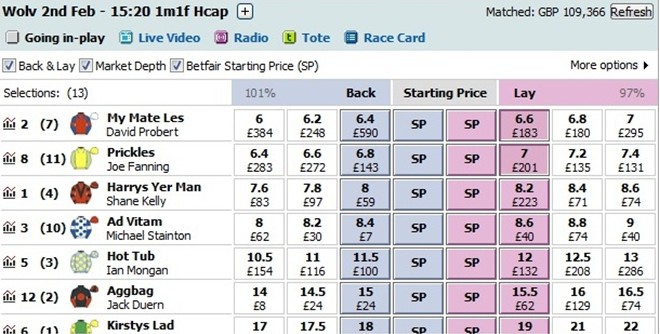
What is Dutching?
Dutching is a slow way to make money but it can pay dividends.
Four guys are sitting in a pub, passing some time by watching horse racing on the TV. There's not a lot of luck about, except for one guy who seems to be winning nearly every race he dabbles in.
"Joe, what's your secret, how are you picking so many winners?" his friend asks.
"It's easy, I normally just stick a pin in the paper" replies Joe.
"But how come you've got it right nearly every time?" his friend wants to know.
"Well, today I decided to use a fork!"
Backing more than one selection in a race is frowned upon in certain gambling circles: "If you don't have 100 per cent confidence in your selection, don't have a bet" ... or so the mantra goes.
The reality however is not so simple. Horses are mere four legged animals and very often throw the script out the window. Near misses, close finishes and above all, hard luck stories come thick and fast in this game.
Sometimes it's good to have a back-up plan, and having three or four horses running for you in a race can drastically reduce the chances of something going wrong. The cynics will sneer and point out that picking a few horses in a single race obviously gives you a better chance of winning, but a lower return ... yet isn't winning the whole point here? Who cares if it takes two, three, four or even five horses to achieve that win.
Unfortunately, It's not as simple as picking three or four horses with a pin (or fork!), sticking a tenner on each and hoping for the best. Races that are likely to prove profitable must be identified and just as importantly, the amount bet on each horse is calculated so that the same amount of profit is achieved should any of the horses win the race. This approach is known as 'dutching' and legend has it that the strategy was first created by Al Capone's accountant "Dutchy" Schultz, hence its name.
Dutchy was patient and knew the strategy wasn't a get rich quick scheme, but as an accountant, he appreciated regular, steady profit. Some things haven't changed much - patience and discipline are still required in order to become successful at dutching.
To explain further, we can look at an example:
Let's presume you feel that two horses have an exceptionally good chance at winning, but can't decide which one to bet on. Instead of picking one, we can dutch the horses. The first step is to note the prices. In this case;
- Horse A is 3.0
- Horse B is 5.0
Next, you must decide how much you are willing to risk IN TOTAL for the bet. In this case, we shall assume that the total amount you are willing to risk is £100.
The last step is to split up the stake between the two horses, and place £62.50 on horse A, and £37.50 on horse B - Therefore, the total cost of bet is £100.
The outcome?
If horse A wins, you gain £125, but lose the £37.50 staked on horse B. Total profit should horse A win: £87.50
If horse B wins, you gain £150, but lose the £62.50 staked on horse A. Total profit should horse B win: £87.50
So as you can see, it does not make a difference which of your horses win, as you gain £87.50 either way. At this point, I should note that the above maths do not have to be worked out manually - simply type 'dutching calculator' into a search engine, and you'll find a calculator that will work out the stakes for you. Needless to say, using traditional odds when dutching can become a bit of a nightmare, so decimal odds are a must for their flexibility and extra price variations.
Picking which races and horses to dutch is up to you, but with a bit of research, it should be relatively easily to find an edge. Last season for example, I noted that in non-handicap flat racing, the winner came from the top three in the betting roughly 70 per cent of the time. Therefore, dutching the top three in the betting would produce a 70 per cent chance of a winning bet. I decided to go one step further, and only bet if the overall potential profit was at least 25 per cent of my stake. I also excluded lower class races. The results are by no means scientific, but after 100 dutches, I had 64 winning races, and a profit of nearly £710 (using £100 per dutch). Granted, it's a relatively small sample, but it proves that a simple approach can often pay dividends.
Dutching wont provide instant riches, and plenty of patience is required while waiting on suitable opportunities for bets. If you're looking to get rich quick, this approach is not for you - try the lotto instead!
For those willing to put in some research however, dutching can provide steady, regular profits if a sensible, systematic approach is employed.
SIGN UP TO THE TPS RATINGS AND START DUTCHING TODAY!
